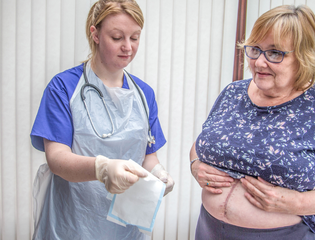Anti-angiogenics
What is an anti-aniogenic? Also known as Avastin (bevacizumab)
Avastin (the brand name of the drug bevacizumab) belongs to a group of treatments called ‘anti-angiogenics’. These treatments stop cancer from developing new blood vessels. This restricts the supply of food and oxygen to the cancer, which means it is starved and unable to grow.
Who is it available for?
Avastin is for women with advanced epithelial ovarian cancer (stages 3 or 4).
Access differs depending on which part of the UK you live in, so speak to your cancer team to find out more.
How is it given?
Avastin is given through a drip (IV) every three weeks in hospital as an outpatient. It will usually be given slowly for the first infusion (taking 90 minutes), to check there are no problems, and then in future sessions it takes less time (as quick as 30 minutes). It can be given alongside chemotherapy, and it can be continued afterwards as a maintenance treatment (to stop the cancer from coming back).
What are the side effects?
A small proportion of people experience a reaction to Avastin during the treatment infusion. The medical team on the day will monitor you carefully, so they can act if this happens. The first treatment is most likely to cause a reaction, and it is slower for this reason.
Some people experience side effects after taking Avastin.
Side effects can include:
Higher risk of infection
Bruising/bleeding
High blood pressure
Feeling sick
Tummy pain
Constipation or Diarrhoea
Tiredness
Headache
Sore mouth
Taste changes
Muscle/joint pain
Numbness/ tingling in hands/feet (peripheral neuropathy)
Dry/itchy skin
Watery eyes
Blood clots
Slower wound healing (you would need to pause Avastin treatment if you are having any surgery or invasive dental work)
You will have regular blood tests to keep track of your blood levels and the functioning of your liver and kidneys. You will also have other checks like blood pressure monitoring.
It’s very important to keep your cancer team updated with any side effects you’re having so they can advise you. They will let you know how to contact them if you’re experiencing any of the above, and many NHS trusts have a 24-hour hotline to check in if you are worried.
What do our supporters tell us?
“I am on Avastin. I feel that it greatly benefits me. I equate it to a hunter gatherer, searching and finding all the cancer cells and restricting, the blood supply and eradicating... Side effects, a little constipation that is bearable.”
Combination of Avastin® and Olaparib
The combination of Avastin® (bevacizumab) is available for high grade advanced (stage 3 or 4) ovarian cancer, after it has responded to first line platinum chemotherapy that was given alongside Avastin. The cancer must be found to show homologous recombination deficiency (HRD). This includes people whose cancer has a BRCA1/2 fault. For more information about HRD see here.


